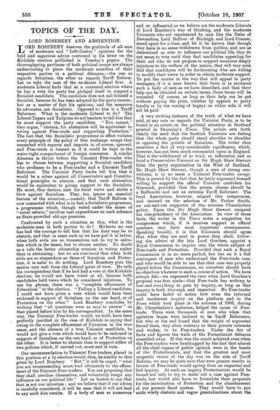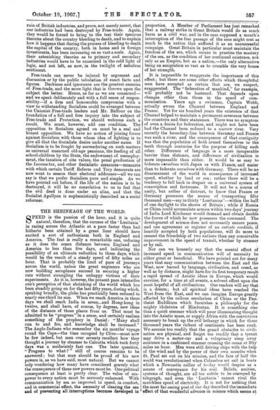TOPICS OF THE DAY.
LORD ROSEBERY AND ABSTENTION. LORD ROSEBERY deserves the gratitude of all men of moderate and " Left-Centre ' opinions for the bold and sagacious advice contained in his letter on the Kirkdale election published in Tuesday's papers. The thoroughgoing partisans of both political camps are always endeavouring to place the moderate members of their respective parties in a political dilemma,—the one as regards Socialism, the other as regards Tariff Reform. Let us take the case of the moderate Liberal first. A moderate Liberal finds that at a contested election where he has a vote the party has pledged itself to support a Socialist candidate. The candidate does not call himself a Socialist, because he has been adopted by the party caucus; but as a matter of fact his opinions, and the measures he advocates, are Socialistic. Opposed to him is a Tariff Reformer. What is the moderate Liberal to do ? The Liberal Tapers and Tadpoles do not hesitate to tell him that he must support the party candidate. "You cannot," they argue, "abstain, for abstention will be equivalent to voting against Free-trade and supporting Protection." The fact that the Socialistic programme in effect violates every principle of the policy of free exchange except that connected with exports and .imports is, of course, ignored, and Free-trade is treated as if it could be kept in the water-tight compartment of foreign commerce. A similar dilemma is thrust before the Unionist Free-trader who has to choose between supporting a Socialist candidate who professes to be a Free-trader and a Unionist Tariff Reformer. The Unionist Party hacks tell him that it would be a crime against all Conservative and Constitu- tional principles to abstain, and that such abstention would be equivalent to giving support to the Socialists. He must, they declare, sink his fiscal views and strike a blow against Socialism. They, too, ignore an essential feature of the situation,—namely, that Tariff Reform is now connected with what is in fact a Socialistic programme, a programme which, though veiled under the name of "social reform," involves vast expenditure on such schemes as-State-provided old-age pensions.
Confronted by such a situation as this, what is the moderate man in both parties to do ? Hitherto no one has had the courage to tell him that his duty may be to abstain, and that in cases such as we have put it is better, when both evils are so tremendous, not to try to calcu- late which is the lesser, but to choose neither. No doubt as a rule the better citizenship consists in voting rather than in abstaining ; but we are convinced that when both evils are so stupendous as those of Socialism and Protec- tion, it is safer to do nothing. Lord Rosebery puts the matter very well from the Liberal point of view. He tells his correspondent that if he had had a vote at the Kirkdale election, he would not have voted at all, because both candidates held views which he considered injurious. To use his phrase, there was a "complete effacement of Liberalism " at the election. "Failing a Liberal candidate, I could not have given a vote which would have been reckoned in support of Socialism on the one hand, or of Protection on the other." Lord Rosebery concludes by iiishing that "all questions were as easy to answer" as that placed before him by his correspondent. In the same way, the Unionist Free-trader would, we hold, have been perfectly justified in the case of Kirkdale in saying that owing to the complete effacement of Unionism in the true sense, and the absence of a true Unionist candidate, he would not give a vote which would have to be reckoned in support of Socialism on the one hand, or of Protection on the other. It is better to abstain than to support either of two policies which, if carried out, must end in ruin.
• Our recommendation to Unionist Free-traders, placed in this position at a by-election would, then, be similar to that given by Lord Rosebery. "But," it will be urged, "what you. are recommending must lead ultimately to the efface- ment of the Unionist Free-traders. You are proposing that they shall sterilise themselves, and voluntarily resign any influence on our political life." Let us hasten to say that that is not our intention ; and we believe that if our advice is carefully considered, it will be seen that it will not lead to iiny such dire results. If a body of men so numerous and so influential as we believe are the moderate Liberals of Lord Rosebery's way of thinking, and the moderate Unionists who are represented by men like the Due of Devonshire, Lord Balfour of Burleigh, and Lord Cromer, stand apart for a time, and let it be known that though they have in no sense withdrawn from politics, and are as determined as ever to influence our political life, they do not mean to vote until they find candidates appealing for their aid who do not propose to support measures deeply injurious to the welfare of the nation, they will very soon find that candidates will be forthcoming who are willing to modify,their views in order to obtain moderate support. To put the matter in the way that will appeal to party managers, if it is once known that there is in existence such a body of men as we have described, and that their help can be obtained on certain terms, those terms will be conceded. Of course, as long as their help can be got without paying the price, whether by appeals to party loyalty or by the raising of bogeys on either side, it will not be paid.
A very striking instance of the truth of what we have said, at any rate as regards the Unionist Party, is to be found in an article on the political situation in Scotland printed in Thursday's Times. The article sets forth clearly the need that the Scottish Unionists are feeling that the whole party should stand shoulder to shoulder in opposing the growth of Socialism. The writer then mentions a fact of very considerable significance, which, however, has not been much commented upon in England. That is the withdrawal of so tried, so influential, and so loyal a Conservative Unionist as Sir Hugh Shaw Stewart from the party organisation in the West of Scotland. Sir Hugh Shaw Stewart, though a man of strong con- victions, is in no sense a Unionist Free-trader enrage. This is proved by the fact that he lately expressed himself willing to support the official Unionist candidate for Greenock, provided that the person chosen should 'be a Balfourite and not an extreme Tariff Reformer. The local Association, however, refysed this compromise, and insisted on the selection of Mr. Parker Smith, an out-and-out supporter of the. extreme Chamberlain policy. Upon this Sir Hugh Shaw Stewart resigned his vice-presidency of the Association. In view of these facts, the writer in the Times notes a suggestion for compromise which, if it receives support in official quarters, may have most important consequences: Speaking broadly, it is that Unionists should agree, that when they are next in power they shall, follow- ing the advice of the late Lord Goschen, appoint a Royal Commission to inquire into the whole subject of Free-trade and Protection. Provided that such a Royal Commission is in no sense packed, but has on it a full contingent of men who understand the Free-trade case, and who would be able to see that that case was properly placed before the Commission, we ourselves should have no objection whatever to such a course of action. We have always felt—we expressed the view when Lord Goschen's proposal was first made—that Free-trade has nothing to lose and everything to gain by inquiry, as long as that inquiry is both thorough and impartial. No Free-trader could have failed to notice how even the informal and incoherent inquiry on the platform and in the Press which took place in the autumn of 1903, during Mr. Chamberlain's agitation, helped the cause of Free- trade. There were thousands of men who when that agitation began were inclined to be Tariff Reformers, but who at the end found that the weight of argument forced them, very often contrary to their private interests and wishes, to be Free-traders. Under the fire of facts and figures the walls of the Protectionist defences crumbled away. If this was the result achieved even when the Free-traders were handicapped by the fact that ahnost all the chief organs of public opinion were in the hands of the Protectionists, and that the greatest and most magnetic orator of the day was on the side of Tariff Reform, we may be quite sure that even greater results in favour of Free-trade would spring from an impartial and full inquiry. At such an inquiry Protectionists would be bound not only to try. to make out a case against Free- trade, but would also have ,to formulate their proposals for the introduction of Protection and the abandonment of our present fiscal system. They would have to put aside windy rhetoric and vague generalisations about the ruin of British industries, and prove, not merely assert, that our industries had been destroyed by Free-trade. Again, they would be forced to bring to the test their specious theories about the country bleeding to death, and to explain bow it happens that during the process of bleeding to death the capital of the country, both in home and in foreign investments, has been increasing on so vast a scale. Again, their astonishing theories as to primary and secondary industries would have to be examined in the cold light of logic, and not left, as now, in the twilight of nebulous sentiment.
Free-trade can never be injured by argument and discussion or by the public tabulation of exact facts and figures. Darkness and ignorance are the greatest enemies of -Free-trade, and the more light that is thrown upon the subject the better. Hence, as far as we are concerned— and we speak deliberately and with a full sense of respon- sibility—if a firm and honourable compromise with a view to withstanding Socialism could be arranged between the Unionist Free-trade leaders and Mr. Balfour on the foundation of a full and free inquiry into the subject of Free-trade and Protection, we should welcome such a result. We must, however, add one condition. The opposition to Socialism agreed on must be a real and honest opposition. We have no notion of joining forces against Socialism with those whose idea of fighting is to give all that the Socialists desire under another name. If Socialism is to be fought by surrendering on such matters as universal unearned old-age pensions, the feeding of all school-children by the State, the endowment of unemploy- ment, the taxation of site values, the penal graduation ef the Income-tax, and other Socialistic measures—measures with which certain Tariff Reform and Tory democrats are now wont to season their electoral addresses—all we can say is that we prefer Socialism pure and simple. As we have pointed out before, if the life of the nation is to be destroyed, it will be no consolation to us to feel that the evil deed is. done under an alias, and that the Socialist Apollyon is euphemistically described as a social reformer.











































 Previous page
Previous page